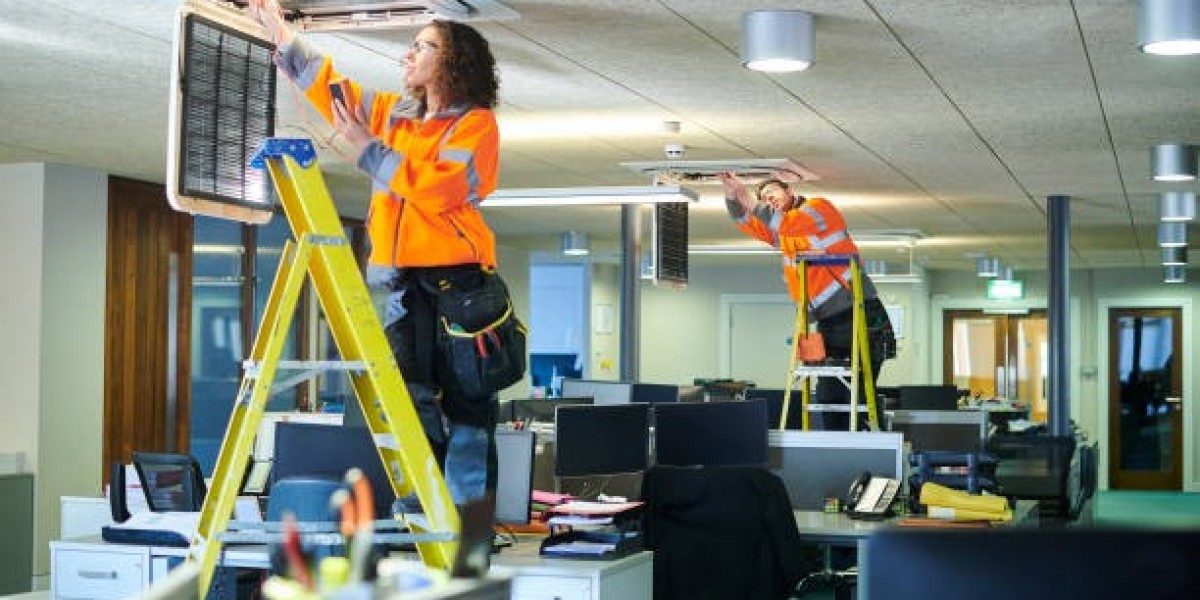In today’s digital and highly interconnected business landscape, productivity is king. Companies are continuously investing in smarter infrastructure, flexible work environments, and cutting-edge technology. Yet, behind every gleaming office tower or coworking hub is a team of unsung heroes—office electricians. These professionals ensure that the lights stay on, the servers keep humming, and the countless devices we depend on every day remain powered and safe. Without them, modern workspaces would grind to a halt.
The Backbone of a Digital Workplace
Every modern office, from startups to multinational corporations, relies on complex electrical systems to function efficiently. From powering computers and conference systems to managing HVAC (Heating, Ventilation, and Air Conditioning), lighting, and access control systems, electricity forms the foundation of productivity.
Office electricians are tasked with more than just installing wires or replacing lightbulbs. Their role encompasses planning, installation, maintenance, compliance, and upgrades of intricate electrical systems designed to meet modern demands. With increasing digitization and the shift toward energy efficiency and smart office environments, the scope and sophistication of their responsibilities have evolved significantly.
Keeping the Power Flowing
Electricians are essential for maintaining consistent, uninterrupted electrical flow throughout office buildings. They install distribution panels, ensure circuit breakers are correctly configured, and design systems that balance loads to prevent power failures. An outage, even one lasting just a few minutes, can result in massive financial losses, particularly for organizations heavily reliant on digital operations.
According to a U.S. Department of Energy report, power outages cost the U.S. economy approximately $150 billion annually in lost productivity and equipment damage (source). Office electricians play a crucial role in minimizing such losses by implementing reliable systems, backup power solutions, and preventive maintenance routines.
For instance, electricians might install Uninterruptible Power Supply (UPS) units for critical systems, ensuring they remain operational during outages. They also manage connections to generators and help design tiered power systems where priority equipment receives backup power immediately.
Smart Office Integrations
The rise of smart offices has introduced even more complexity to the role of electricians. Smart lighting, climate control, access systems, and energy monitoring solutions require careful integration and programming. Electricians must now understand not just wiring, but networking, automation protocols, and often software interfaces as well.
Office buildings today are often equipped with Building Management Systems (BMS) that integrate HVAC, lighting, and security systems for centralized control. Electricians are responsible for installing and wiring the components that enable these systems to function cohesively. They ensure the electrical backbone of these systems is secure, reliable, and expandable for future upgrades.
In addition, as more organizations move toward sustainable energy use, electricians are increasingly installing energy-efficient systems like LED lighting, motion sensors, and daylight harvesting technologies. These not only reduce carbon footprints but also cut down on utility bills and contribute to employee wellness.
Safety First: Ensuring Code Compliance
Safety is paramount in any workplace, and office electricians are at the frontline of ensuring a secure electrical environment. Faulty wiring, overloaded circuits, or improper grounding can lead to fire hazards, equipment failure, or even fatal accidents. Office electricians are trained to adhere to national and local codes, such as the National Electrical Code (NEC) in the U.S., to maintain safe operations.
Routine inspections, testing of Residual Current Devices (RCDs), and thermal imaging of switchboards are some of the preventive measures electricians use to detect issues before they become dangerous. By maintaining compliance and ensuring that installations meet safety standards, electricians protect both people and property.
Efficiency Through Preventive Maintenance
An ounce of prevention is worth a pound of cure—especially in office environments where downtime can mean lost clients, missed opportunities, or operational chaos. Preventive maintenance is one of the most valuable services office electricians provide.
They conduct regular checks on systems, test for voltage drops, inspect wiring insulation, replace aging components, and monitor performance logs. This maintenance keeps systems efficient, prevents surprise breakdowns, and extends the life of costly electrical equipment.
Preventive maintenance also supports sustainability goals. Poorly maintained electrical systems tend to be less efficient, drawing more power and increasing operational costs. Electricians play a pivotal role in energy conservation through routine system optimization and upgrades.
Empowering Remote Work
The COVID-19 pandemic forever altered how we view workspaces. Hybrid work models and remote collaboration have become mainstream, and office electricians have had to adapt to new demands. With a portion of the workforce operating remotely, offices now need to support both in-person and remote functionality seamlessly.
Electricians install and manage advanced conferencing systems, reliable internet access points, and redundant power solutions to support cloud-based operations. Additionally, they often facilitate the setup of home office electrical systems for remote workers, ensuring that those employees have safe, compliant power setups at home.
Supporting IT Infrastructure
Data is the lifeblood of modern business, and office electricians are deeply involved in protecting and powering IT infrastructure. From server rooms to cloud hubs, these environments demand precision in electrical planning and execution.
Office electricians are responsible for clean power delivery, dedicated circuits, grounding systems, and climate control integration in server rooms. Overheating, electrical noise, or power surges can cause data corruption or equipment failure. Ensuring uptime for IT infrastructure is arguably one of the most mission-critical roles electricians serve.
In a survey conducted by Uptime Institute, 80% of data center managers reported experiencing an outage in the past three years, with many attributing it to power issues (source). Electricians help reduce this risk with meticulous design and redundancy planning.
Rapid Response and Emergency Repairs
No matter how carefully systems are designed and maintained, emergencies still happen. Electricians are the first responders when systems fail. Whether it's a tripped breaker, a power surge, or equipment malfunction, rapid diagnosis and repair are critical.
Office electricians often work on-call or have service-level agreements with businesses to ensure minimal downtime during such events. Their ability to troubleshoot under pressure ensures that productivity losses are kept to a minimum.
Collaboration with Other Trades
Electricians do not work in isolation. They collaborate closely with HVAC technicians, IT professionals, facility managers, architects, and construction crews. This interdisciplinary coordination is especially vital in large office projects where different systems—mechanical, electrical, and digital—must be seamlessly integrated.
For example, during a new office fit-out, electricians coordinate with designers to ensure optimal lighting layouts, with data cabling teams for power placement, and with building management to ensure compliance with broader facility standards. This collaborative role ensures the holistic functionality of the workplace.
The Future of Office Electricians
As workplaces continue to evolve, the role of office electricians is also transforming. The rise of artificial intelligence, Internet of Things (IoT) devices, and green building initiatives will expand their responsibilities even further.
Electricians will increasingly need to understand energy analytics, cybersecurity (as many systems are now network-connected), and sustainable energy technologies like solar integration or battery storage. Continued education and adaptability will be key traits for success in the coming years.
Many companies are beginning to prioritize certifications not just in traditional electrical work, but also in smart technologies and green building practices. As the digital and physical realms of offices continue to merge, electricians will become even more integral to organizational success.
Conclusion
In an age where every business is driven by digital tools, connected systems, and a constant need for efficiency, office electricians are indispensable. They do far more than manage cables or change light bulbs—they power the productivity of entire organizations.
Their work ensures operational continuity, supports digital infrastructure, enhances safety, and helps businesses meet energy efficiency goals. As technology continues to evolve and office environments grow increasingly complex, the importance of skilled, knowledgeable electricians will only rise.
From the moment an employee logs in to start their workday to the time the last light is turned off at night, office electricians are the silent force keeping everything running smoothly.



